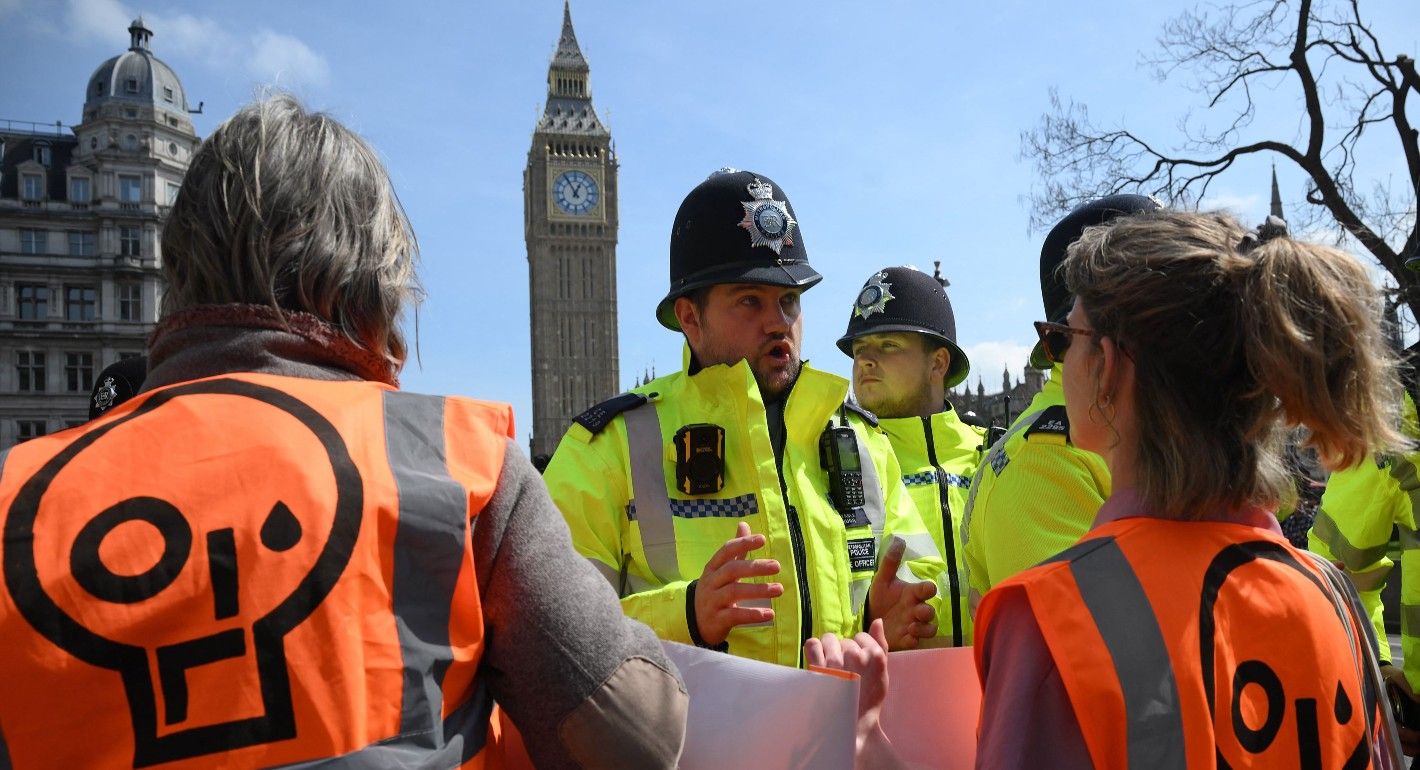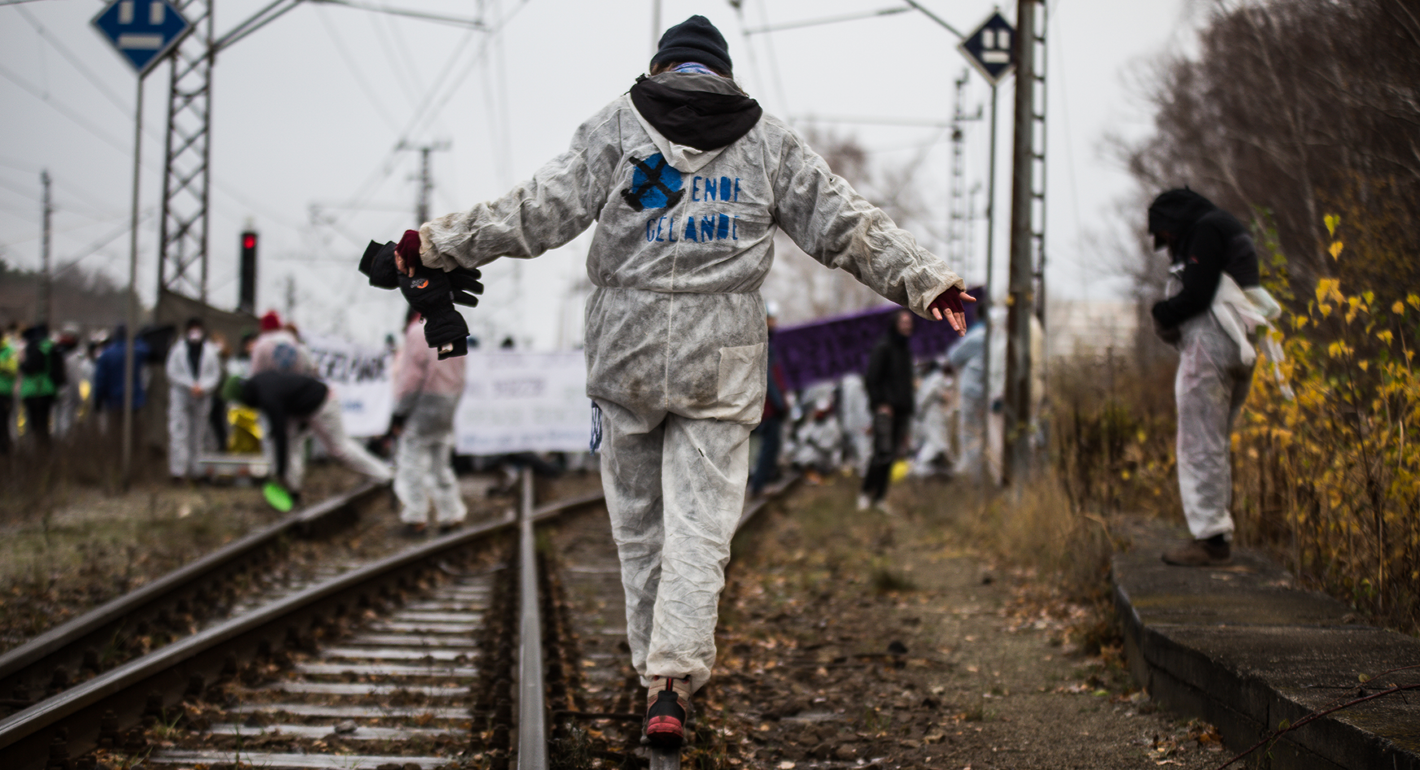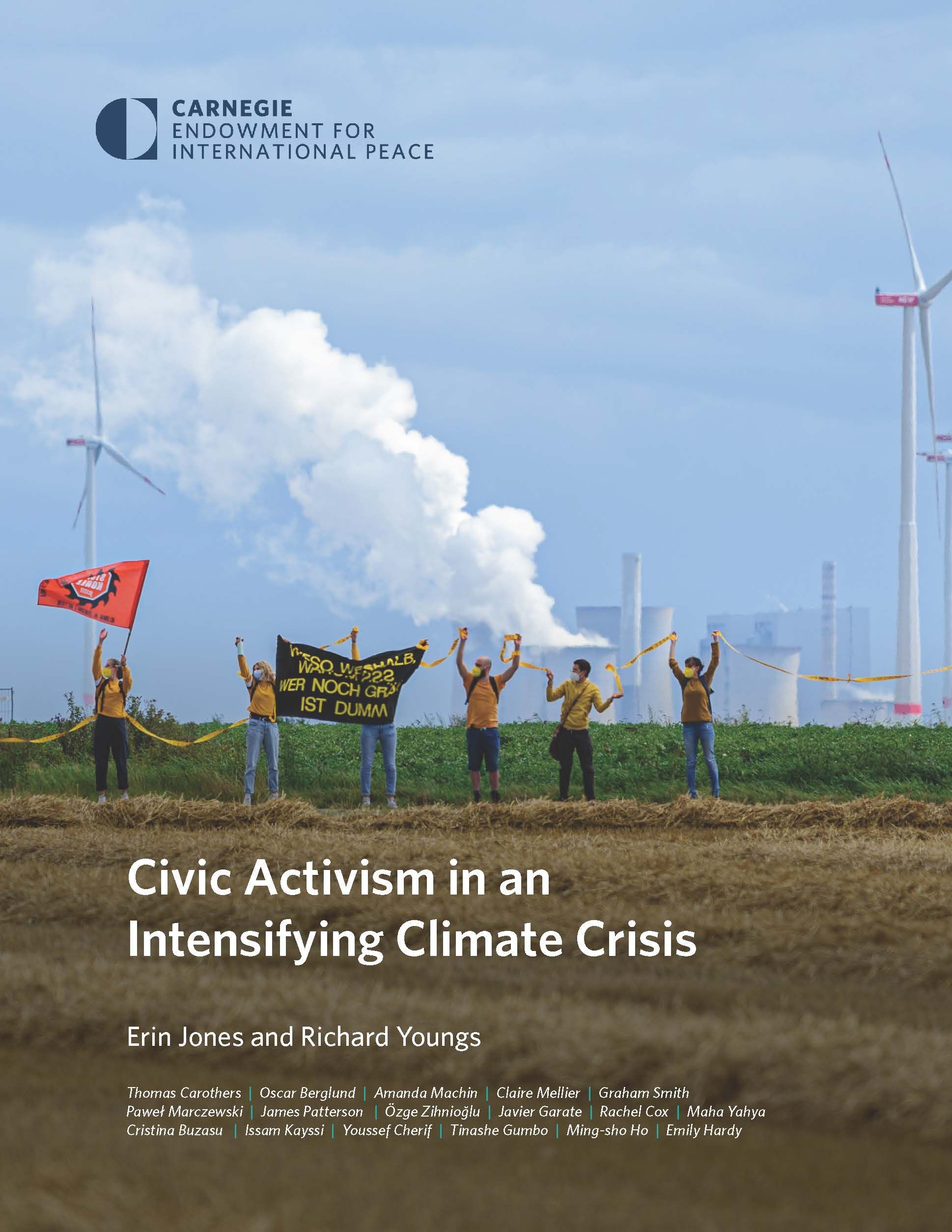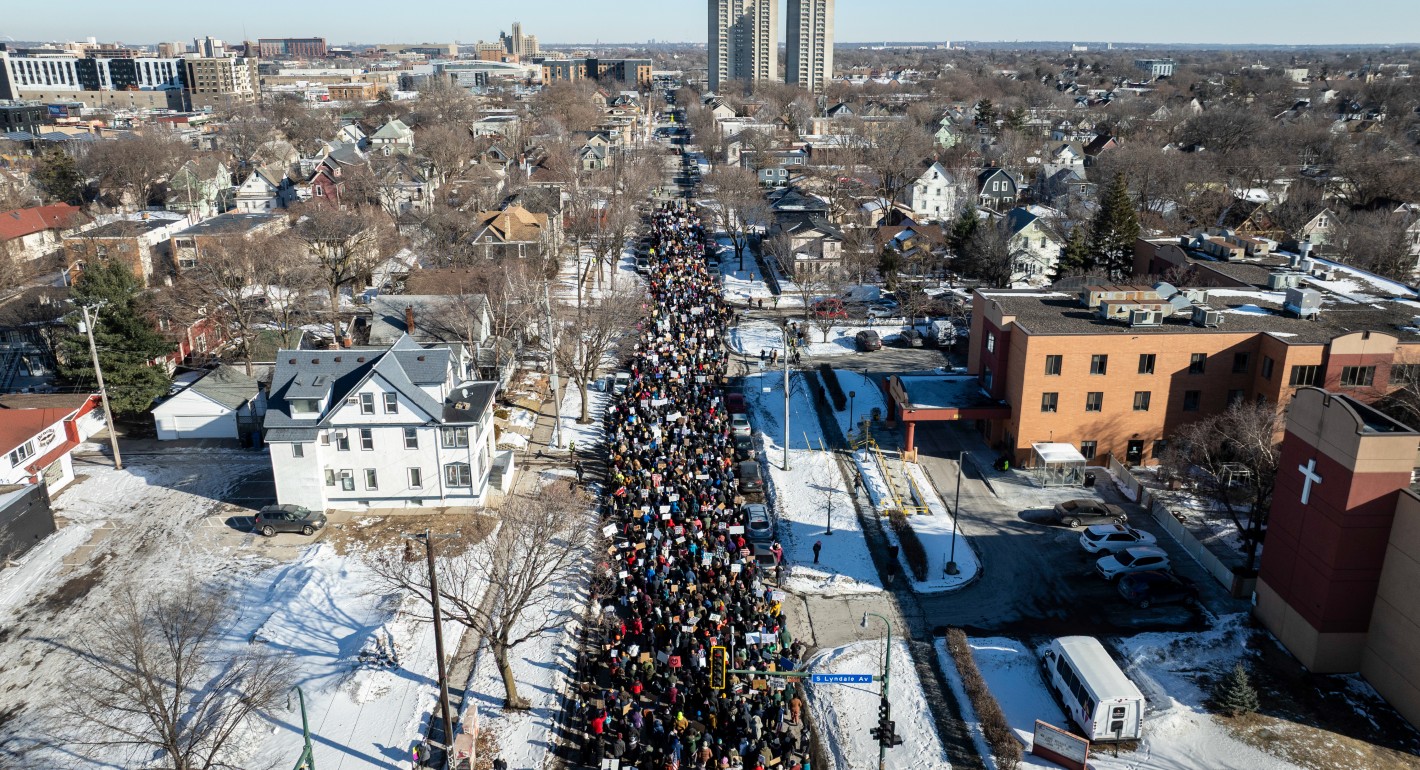As the climate crisis intensifies, climate activism is ramping up. But “climatage” remains an unpopular tactic for this movement.

London metropolitan police officers and Just Stop Oil climate activists (Photo by DANIEL LEAL/AFP via Getty Images)
The Growing Criminalization of Climate and Environmental Protests
As states and corporations ramp up repression on climate protests, activists and broader civil society are adapting their tactics to reach a wider audience.
The criminalization and repression of climate and environmental activists have intensified globally in the past few years.1 These are forms of backlash against often impactful social movements. The repressive wave has sparked major concerns in many quarters, with the UN secretary general, the UN special rapporteur on environmental defenders, and many nongovernmental organizations (NGOs), politicians, and social movements speaking out against it.2 In this article I will draw on findings from a University of Bristol project that I led on this topic.3 Driven by a combination of state and corporate actors, the repression of climate and environmental protest is a truly worldwide phenomenon that takes place across the Global North and South.
The article first identifies five forms of criminalization and repression. These include using new legal measures, such as anti-protest laws, or misusing existing legislation to treat activists as terrorists or organized crime syndicates, as well as changing judicial processes to make sentences more likely. They also include a range of policing practices from legal (arrests) to extralegal (harassment and infiltration) and criminal (murder). These forms of repression are in turn fueled by the vilification of activists.
The second part of the article discusses how activists respond and adjust to repressive contexts. One long-used tactic is to counteract vilification by legitimizing activists as political actors. This includes bearing witness and calling out the use of extralegal and criminal repression used by state and corporate actors. Another, albeit sporadic, tactic is to engage in sabotage. Lastly, activists may focus on forms of disruptive protest that carry greater legitimacy, thereby making it more costly for state or corporate actors to repress them.
Criminalization and Repression
New Anti-Protest Laws
Such laws may create new offenses, extend maximum sentence length for existing offenses, give police more powers to stop protests and surveil activists, or stop NGOs from legally supporting activists. The UK’s Police, Crime, Sentencing and Courts Act (2022), for example, allows police to restrict protests’ starting and finishing times, as well as noise levels.4 Likewise, various state-level laws in Australia and the United States expand the definition of “critical infrastructure” and target popular activist tactics, such as lock-ons.5 Peru recently passed a law strengthening the ability of the Peruvian Agency for International Cooperation to repress NGOs. It stipulates that if an NGO receives funding from abroad, it cannot contribute to the legal defense of activists without state approval through the agency.6 Many NGOs will now find it difficult to support those persecuted for widespread anti-mining activism in Peru.
Misuse of Existing Legislation
Second, existing laws are used in prosecutions and court proceedings to criminalize and repress climate and environmental activists. Anti-terrorism laws have been used in many countries against environmental activists who are definitely not terrorists. In the Philippines, authorities use a tactic called red-tagging to label activists as terrorists, thereby enabling more violent repression.7 In France, the government sought to dissolve the environmental collective Soulèvements de la Terre using anti-separatism legislation originally intended to police so-called Islamic extremist groups.8 In Germany and Spain, laws developed to deal with organized crime have been used against climate group Letzte Generation and vegan activist group Futuro Vegetal, respectively.9 In the UK, courts have limited both the kind of defenses defendants can use and the kind of evidence that can be taken into consideration.10 This has led to absurd situations where climate activists are on trial, but prohibited to speak about climate change.
Public and Private Policing
Policing is carried out not just by the police and other state actors but also by private security companies and corporations. Policing practices span from legal to extralegal to criminal. On the legal end, police arrest climate and environmental activists. Research from my project at the University of Bristol shows that Australia, Canada, and the UK exhibit the highest arrest rates at climate and environmental protests. Countries with lower rates of arrests often have higher rates of police violence, such as France, Peru, South Africa, and Uganda.11 Climate and environmental activists are often exposed to surveillance, infiltration, harassment, threats, and assaults. In the UK, the Spy-Cops scandal revealed how undercover police officers had infiltrated activist groups that were often not accused of wrongdoing. The most infamous case involved undercover officer Bob Lambert, who fathered a child with an unsuspecting activist.12 At times, states have condoned extralegal (and even obviously criminal) policing tactics. In a high-profile case in the Philippines, armed forces abducted environmental activists Jonila Castro and Jhed Tamano and tried to force them to make a false public statement admitting to being communists and terrorists. Instead, they told the public about the threats and harassment they had endured during their abduction.13 Around the world, including in the United States and the UK, private security companies have often been hired to help surveil or infiltrate activist groups.14 In Peru, the police themselves act as a kind of private security company, as mining companies can pay the police force to provide them security and repress activists.15
To address the deepening climate crisis, climate activism is employing a wider variety of tactics and aiming at a broader set of goals. In response, the movement faces stronger repression and civic backlash against climate action.
Murder of Climate Activists
The fourth and most serious kind of repression occurs when environmental activists are killed because of their activism. The NGO Global Witness conducts the best documentation of such killings, counting over 2,100 murders since 2012.16 Most of these killings take place in resource-rich countries with high levels of foreign direct investment, including Brazil, Colombia, Mexico, and the Philippines.17 It is nevertheless a global problem, since the killings are often connected to disputes involving corporations based in the Global North. The perpetrators of the murders vary between countries and cases, with police mostly responsible in India and Peru, armed forces in the Philippines, and hit men and landowners in Brazil.18 Killings are often preceded by death threats and other kinds of harassment and carried out by the same actors who do the policing.19
Public Vilification
Lastly, vilification processes—attempts to smear and discredit climate and environmental activists—feed all the forms of criminalization and repression discussed above. Politicians, media, corporations, and think tanks contribute to vilification by promulgating discourses that dehumanize activists and encourage and enable the other forms of criminalization and repression. They steer attention away from climate and ecological crises and vastly exaggerate the harm and disruption caused by activists. Swedish Prime Minister Ulf Kristersson and former Australian prime minister Scott Morrison have denounced climate activists as threats to democracy and civil liberties respectively.20 In India and Peru, vilification of activists on social media has been followed by arrests and disappearances.21 In the UK, some of the most high-profile and vilified activists have received the longest prison sentences, including Phoebe Plummer, who infamously threw tomato soup on the frame and casing of a Van Gogh painting, and Extinction Rebellion and Just Stop Oil co-founder Roger Hallam.22 Investigative journalists have published essays about how the same think tanks that promote the antagonization of activists have also helped draft anti-protest legislation.23
An important discursive strategy in the vilification process is to separate the activists from their causes, because the causes that climate and environmental activists strive for are broadly popular with the public. Large majorities in most countries want to see bold action on climate change.24 It is also easier to feel sympathy for local communities fighting against extractive industries than for the corporations who carry out the destructive extraction. Vilifying activists thus relies on convincing people who are broadly supportive of the goals of activists to nevertheless denounce the activists because of their strategies and tactics. This is achieved by separating the activism from the cause, as is often seen in media reporting. Research I helped to carry out in the Policy & Protest project shows that media reporting about Just Stop Oil in the UK was framed around criminal behavior and law and order.25 It only rarely mentioned climate change or the oil and gas licenses that Just Stop Oil protested. This separation takes a particularly damaging form in court cases where defendants are prohibited from speaking about the climate crisis, despite this being their motivation.26 In short, vilifying discourses are highly destructive and work in a symbiotic relationship with the very real repression of activists.
Responding to Repression
Legitimizing Climate Activism
One key response from civil society is to counteract a vilification process with a legitimation process. Politicians, NGOs, think tanks, academics, and journalists can support activists in this work. Indeed, this series and all of its contributors can be seen as part of a broader effort to legitimize climate and environmental activism and counteract problematic discourses targeting activists.
The legitimation process has two component parts. Firstly, it involves presenting climate and environmental activists as legitimate social and political actors who are fighting for the survival of civilization. One important way to do this is to avoid speaking about activism in a way that separates it from climate and environmental crises. Vilifiers often suggest that activists are selfish.27 The role of the legitimizers is therefore to show that being an activist for a cause that most of humanity supports, and all of humanity would benefit from, is in fact far from selfish. Rather, these activists are putting their bodies and liberty on the line for the greater good. This does not mean that legitimizers must endorse all tactics used by activists. It is perfectly possible to highlight the very worthy cause and the legitimacy of social and political actors without endorsing their tactics.
The role of the legitimizers is to show that being an activist for a cause that most of humanity supports, and all of humanity would benefit from, is far from selfish.
Secondly, the legitimation process involves highlighting, denouncing, and bearing witness to the repression and criminalization of climate and environmental activists. This is of course the mission of NGOs like Amnesty International and Global Witness. Amnesty has long brought criminal state repression of activists to global attention as a way of protecting activists by mounting pressure on authoritarian state behavior.28 Indeed, my very existence was made possible by Amnesty and others putting pressure on the Peruvian state in the 1960s not to execute, and then to liberate, my father.29 Global Witness achieves its goals by mapping and telling the stories of persecuted environmental defenders.30 In this case, choice of words is an important part of the protection. While the word “activist” is neutral in that the speaker may agree or disagree with the activist’s cause and method, “environmental defenders” leaves little room to disagree that these are important actors who ought to be protected.31 Together, these acts of legitimation seek to create an environment that makes repression costly in terms of reputation. If this first response to repression, legitimization, is carried out by a coalition of actors who share the goals of climate and environmental activists, the following two are explicitly activist responses.
Sabotage
A second possible response to criminalization and repression is to go underground and pursue more sabotage-oriented tactics, as Noah Gordon explores in further detail in his contribution to this collection. The logic goes as follows: If nonviolent protests land people in jail for several years, then activists may as well carry out acts of sabotage that could cause greater disruption to the actors that drive climate change. One group that adopted this perspective, the UK-based Shut the System, saw some limited success trying to cut internet access to an insurance firm in London in January 2025.32 Similar undercover acts of sabotage, albeit with much lower stakes, have been intermittently carried out by Tyre Extinguishers around various cities as they deflate SUV tires with lentils.33 These acts of sabotage were encouraged by Andreas Malm’s book How to Blow Up a Pipeline, which critiqued the nonviolence of Extinction Rebellion and served as a kind of sabotage manifesto.34 The book also inspired a film with the same title. However, despite the extensive attention given to Malm’s book, the film, and the small groups they have inspired, sabotage remains a rare practice. Researchers and observers should then be careful in giving it too much intellectual credibility, since it seems to be driven primarily by the sensationalism of the media and entertainment industries.
Changing Tactics
Lastly, activists in countries with quickly deteriorating protest rights will adapt to increased repression by using tactics with greater support and legitimacy, as a shield against repression. Unlike the legitimation carried out by a range of actors set out above, this last response refers specifically to social movement tactics and strategy. It means moving away from unpopular, disruptive protests toward more popular forms. Just because a state has laws, batons, and guns at its disposal to repress protest does not necessarily mean it will use them.35 A key reason groups like Just Stop Oil have been criminalized into extinction is precisely that they had so little legitimacy among the general population.36 But draconian anti-protest laws cannot repress all protest equally. Since UK police were given powers to stop any demonstration that violated noise limits, all kinds of protests have continued to be noisy, but the police have only really used those powers against Just Stop Oil.37 Hypothetically, if new draconian laws had existed in 2019 and broadly popular European youth climate strikers had blocked traffic, they would have been unlikely to receive prison sentences. Their popularity and public appeal would have acted as a shield.
There is nothing new in this lesson. Activists around the world know that it is harder to repress them if they are many and they are supported by many more. If that were not the case, there would not be protest in authoritarian settings—but there are, always have been, and always will be.
Conclusion
Across the world, state and corporate actors together have been driving a wave of criminalization and repression of climate and environmental protest. The best response is to focus on legitimacy. For social movements, that means acting in greater numbers and seeking support from sizeable minorities, if not outright majorities, of the population. Doing so makes it harder for state and corporate actors to repress activists. Broader civil society also has an important role to play in strengthening the legitimacy of activists and counteracting the vilification that they are subjected to. It can do this by connecting protests to the climate and environmental crises that spurred them and drawing attention to repression and criminalization wherever it takes place.
Broader civil society also has an important role to play in strengthening the legitimacy of activists and counteracting the vilification that they are subjected to.
This last point is the key message. Anybody who is concerned about the threat that climate change and environmental degradation pose to human civilization has an interest in defending climate and environmental activists and social movements. Criminalization processes are taking place practically everywhere, and they need to be contested everywhere. Each person has a role to play in that contestation.
In this series of articles, Carnegie scholars and contributors are analyzing varieties of climate activism from around the world, focusing on the intensification of activity both from the protesters themselves and from the authorities and forces who are the objects of their discontent.
Notes
- 1Oscar Berglund et al., “Criminalisation and Repression of Climate and Environmental Protest,” University of Bristol, October 2024, https://crecep.blogs.bristol.ac.uk.
- 2António Guterres (@antonioguterres), “Climate activists are sometimes depicted as dangerous radicals. But the truly dangerous radicals are the countries that are increasing the production of fossil fuels. Investing in new fossil fuels infrastructure is moral and economic madness.,” X (formerly Twitter), April 5, 2022, https://twitter.com/antonioguterres/status/1511294073474367488; Michael Forst, “State Repression of Environmental Protest and Civil Disobedience: A Major Threat to Human Rights and Democracy,” UN Economic Commission for Europe, February 2024, https://unece.org/sites/default/files/2024-02/UNSR_EnvDefenders_Aarhus_Position_Paper_Civil_Disobedience_EN.pdf; “Missing Voices,” Global Witness, September 2024, https://gw.cdn.ngo/media/documents/Missing_Voices_-_Global_Witness_land_and_environmental_defenders_report.pdf; and “Protect the Protest,” Amnesty International, 2024, https://www.amnesty.org/en/what-we-do/freedom-of-expression/protest.
- 3Berglund et al., “Criminalisation and Repression of Climate and Environmental Protest.”
- 4“Police, Crime, Sentencing and Courts Act 2022,” Legislation.gov.uk, 2022, https://www.legislation.gov.uk/ukpga/2022/32/contents.
- 5Amy Westervelt and Geoff Dembicki, “Meet the Shadowy Network Vilifying Climate Protestors,” DeSmog, September 12, 2023, https://www.desmog.com/2023/09/12/atlas-network-vilifying-climate-protestors; and Robyn E. Gulliver et al., “The Criminalization of Climate Change Protest,” Contention 11, no. 1 (June 1, 2023): 24–54, https://doi.org/10.3167/cont.2023.110103.
- 6“Peru: Amendment of the APCI Law Paves the Way for Impunity,” Amnesty International, March 13, 2025, https://www.amnesty.org/en/latest/news/2025/03/peru-modificatoria-de-ley-apci-allana-camino-a-la-impunidad.
- 7CIVICUS, “Philippines: Activists Remain at Risk of Red-Tagging, Disappearances and Fabricated Terrorism Charges,” Civicus Monitor, January 6, 2025, https://monitor.civicus.org/explore/philippines-activists-remain-at-risk-of-red-tagging-disappearances-and-fabricated-terrorism-charges.
- 8CIVICUS, “Concerns About Rule of Law in France as Protests Met with Brutality,” Civicus Monitor, October 28, 2023, https://monitor.civicus.org/explore/concerns-about-rule-of-law-in-france-as-protests-met-with-brutality.
- 9CIVICUS, “Climate Activists’ Homes Raided, Communications Monitored; Pro-Palestinian Protests Repressed,” Civicus Monitor, October 28, 2023, https://monitor.civicus.org/explore/climate-activists-homes-raided-communications-monitored-pro-palestinian-protests-repressed; and Miguel Angel Medina, “La Policía Acusa a 22 Activistas Climáticos Del Grupo Futuro Vegetal de Daños Por Valor de Medio Millón de Euros,” El Pais, January 12, 2024, https://elpais.com/clima-y-medio-ambiente/2024-01-12/la-policia-detiene-a-22-activistas-ecologistas-del-grupo-futuro-vegetal-en-una-operacion-en-11-ciudades.html.
- 10Steven Cammiss, Graeme Hayes, and Brian Doherty, “Defending the Integrity Principle: Necessity, Remorse and Moral Consistency in the Protest Trial,” Oxford Journal of Legal Studies 45, no. 2 (March 14, 2025): 329–357, https://doi.org/10.1093/ojls/gqaf003.
- 11Berglund et al., “Criminalisation and Repression of Climate and Environmental Protest.”
- 12Rob Evans, “‘Spy Cops’ Officer Behaved Recklessly by Fathering Son While Undercover, Inquiry Told,” Guardian, December 3, 2024, https://www.theguardian.com/uk-news/2024/dec/03/spy-cops-officer-behaved-recklessly-by-fathering-son-while-undercover-inquiry-told.
- 13Global Witness, “Missing Voices.”
- 14Erin Jones, “The Police-Pipeline Nexus in the United States,” in “Civic Activism in an Intensifying Climate Crisis,” ed. Erin Jones and Richard Youngs, Carnegie Endowment for Peace, December 10, 2024, https://carnegieendowment.org/research/2024/12/climate-change-protest-activism-green-transition?lang=en#case-study-the-policepipeline-nexus-in-the-united-states; and Andrea Brock, “‘Frack Off’: Towards an Anarchist Political Ecology Critique of Corporate and State Responses to Anti-Fracking Resistance in the UK,” Political Geography 82, (October 2020): 102246, https://doi.org/10.1016/j.polgeo.2020.102246.
- 15Fabricio Rodríguez and César Bazán Seminario, “Authoritarian Practices Between ‘Para-Coloniality’ and ‘Cheap Security’: When Chinese State Capital Meets Neoliberal Copper Mining (and Protests) in Las Bambas, Peru,” Globalizations 21, no. 6 (August 17, 2024): 1057–1075, https://doi.org/10.1080/14747731.2023.2179813.
- 16“Land and Environmental Defenders,” Global Witness, 2024, https://www.globalwitness.org/en/campaigns/environmental-activists.
- 17Philippe Le Billon and Päivi Lujala, “Environmental and Land Defenders: Global Patterns and Determinants of Repression,” Global Environmental Change 65 (November 2020): 102163, https://doi.org/10.1016/j.gloenvcha.2020.102163.
- 18Berglund et al., “Criminalisation and Repression of Climate and Environmental Protest.”
- 19Global Witness, “Missing Voices.”
- 20DN, “Kan Rebellmammorna Rädda Världen?,” dn.se, January 18, 2024, https://www.dn.se/sverige/kan-rebellmammorna-radda-varlden; and CIVICUS, “Smear Campaign Against Green Activists, Anti-Protest Laws and Media Restrictions in Australia,” Civicus Monitor, February 4, 2020, https://monitor.civicus.org/explore/smear-campaign-against-green-activists-anti-protest-laws-and-media-restrictions-australia.
- 21CIVICUS, “Indian Authorities Target Activists, Journalists as They Suppress Support for the Farmers’ Protests,” Civicus Monitor, February 24, 2021, https://monitor.civicus.org/explore/indian-authorities-target-activists-journalists-they-suppress-support-farmers-protests; and CIVICUS, “Another Kakataibo Leader Killed; New Report Finds Top State Officials Potentially Liable in Protest Deaths,” Civicus Monitor, September 10, 2024, https://monitor.civicus.org/explore/another-kakataibo-leader-killed.
- 22Damien Gayle, “Just Stop Oil Protesters’ Jail Sentences Shortened After Appeal,” Guardian, March 7, 2025, https://www.theguardian.com/environment/2025/mar/07/just-stop-oil-protesters-jail-sentences-shortened-after-appeal.
- 23Westervelt and Dembicki, “Meet the Shadowy Network Vilifying Climate Protestors.”
- 24YouGov, “Eurotrack Survey Results,” yougov.co.uk, 2024, https://d3nkl3psvxxpe9.cloudfront.net/documents/Eurotrack_ClimateChange_Nov24_w.pdf.
- 25Samuel Finnerty, Colin J. Davis, and Oscar Berglund, “Public Opinion and Media Analysis Datasets with Code [Data and Code],” Open Science Framework, 2025, https://osf.io/kwp7f/files/osfstorage.
- 26Cammiss, Hayes, and Doherty, “Defending the Integrity Principle: Necessity, Remorse and Moral Consistency in the Protest Trial.”
- 27“M25 Protests: Priti Patel Calls Activists ‘Selfish,’” BBC News, September 17, 2021, https://www.bbc.co.uk/news/uk-england-beds-bucks-herts-58594651.
- 28“Who We Are,” Amnesty International, 2025, https://www.amnesty.org/en/about-us.
- 29Derek Wall, Hugo Blanco: A Revolutionary for Life (Merlin Press, 2018).
- 30Global Witness, “Missing Voices.”
- 31Judith Verweijen et al., “‘Environmental Defenders’: The Power/Disempowerment of a Loaded Term,” in Environmental Defenders, ed. Mary Menton and Philippe Le Billon (Routledge, 2021).
- 32Damien Gayle, “‘A New Phase’: Why Climate Activists Are Turning to Sabotage Instead of Protest,” Guardian, March 8, 2025, https://www.theguardian.com/environment/2025/mar/08/a-new-phase-why-climate-activists-are-turning-to-sabotage-instead-of-protest.
- 33Graeme Hayes and Oscar Berglund, “Tyre Extinguishers: Activists Are Deflating SUV Tyres in the Latest Pop-up Climate Movement,” The Conversation, March 9, 2022, https://theconversation.com/tyre-extinguishers-activists-are-deflating-suv-tyres-in-the-latest-pop-up-climate-movement-178911.
- 34Andreas Malm, How to Blow up a Pipeline (Verso Books, 2021).
- 35Erica Chenoweth and Maria J. Stephan, Why Civil Resistance Works (Columbia University Press, 2011).
- 36Finnerty, Davis, and Berglund, “Public Opinion and Media Analysis Datasets with Code [Data and Code].”
- 37Home Office, “Police Protest Powers, June 2022 to March 2024,” Gov.uk, December 17, 2024, https://www.gov.uk/government/statistics/police-protest-powers-june-2022-to-march-2024/police-protest-powers-june-2022-to-march-2024.
Carnegie does not take institutional positions on public policy issues; the views represented herein are those of the author(s) and do not necessarily reflect the views of Carnegie, its staff, or its trustees.
More Work from Carnegie Endowment for International Peace
- From Loss and Damage to Climate Mobility ActionCommentary
Senior climate, finance, and mobility experts discuss how the Fund for Responding to Loss and Damage could unlock financing for climate mobility.
Alejandro Martin Rodriguez
- Federal Accountability and the Power of the States in a Changing AmericaCommentary
What happens next can lessen the damage or compound it.
Mariano-Florentino (Tino) Cuéllar
- The United States Should Apply the Arab Spring’s Lessons to Its Iran ResponseCommentary
The uprisings showed that foreign military intervention rarely produced democratic breakthroughs.
Amr Hamzawy, Sarah Yerkes
- Africa’s Democratic Kaleidoscope: Trends to Watch in 2026Article
Supporters of democracy within and outside the continent should track these four patterns in the coming year.
Saskia Brechenmacher, Frances Z. Brown
- Taking the Pulse: Is It Time for Europe to Reengage With Belarus?Commentary
In return for a trade deal and the release of political prisoners, the United States has lifted sanctions on Belarus, breaking the previous Western policy consensus. Should Europeans follow suit, using their leverage to extract concessions from Lukashenko, or continue to isolate a key Kremlin ally?
Thomas de Waal, ed.













